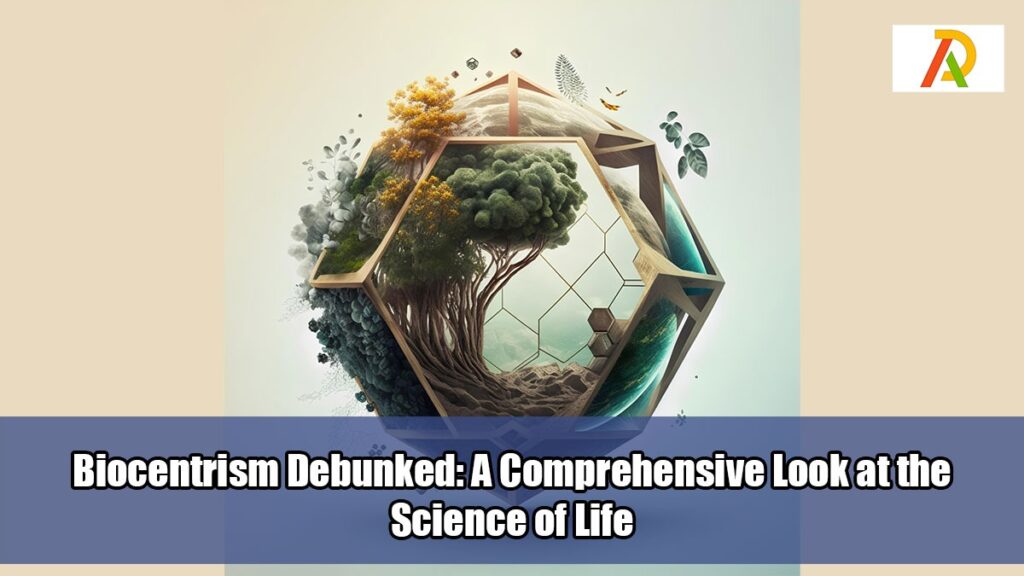Biocentrism Debunked: A Comprehensive Look at the Science of Life

Biocentrism, at its core, advocates that life and consciousness are foundational to understanding the cosmos. But is this just a philosophical perspective, or does it carry scientific weight? This in-depth analysis seeks to illuminate the debate surrounding biocentrism, examining the compelling arguments which have “biocentrism debunked.”
The Pillars of Biocentrism
Biocentrism rests on several key pillars:
- Life Creates the Universe: Unlike the traditional belief where the universe came into being first, biocentrism suggests that life creates the universe.
- Time and Space: From a biocentric perspective, time and space are subjective and are tools of animal understanding.
- Quantum Theory: Biocentrism leans heavily on quantum physics, suggesting that the behavior of particles at the quantum level is linked with our observation.
Biocentrism Debunked: Delving into the Criticisms
1. Ambiguity and Lack of Empirical Evidence
One of the biggest criticisms of biocentrism is its lack of empirical evidence. Many detractors argue that the theory is metaphysical in nature and lacks the concrete data necessary for it to be taken seriously in the scientific community.
2. Misrepresentation of Quantum Physics
Critics argue that biocentrism misrepresents quantum mechanics, oversimplifying concepts to fit its narrative. Quantum physics is a field replete with mysteries, and while it does entertain ideas of observer-dependency, it doesn’t necessarily validate biocentrism.
3. Anthropocentrism Redux
Another criticism levied at biocentrism is its resemblance to anthropocentrism. By placing human consciousness at the center of the universe’s understanding, it arguably displays a human-biased view of existence.
4. Lack of Predictive Power
Most scientific theories have predictive capabilities. Biocentrism, critics argue, fails to predict any natural phenomena or offer solutions to existing scientific problems.
Prominent Voices in the Debate
The biocentrism debate has seen contributions from diverse quarters:
- Robert Lanza: As a chief advocate, Lanza’s work on stem cells and cloning also colors his perspective on biocentrism.
- Brian Greene: A physicist known for his work on string theory, Greene emphasizes the importance of empirical validation in any scientific endeavor.
- Deepak Chopra: Chopra, a spiritual guru, often aligns with biocentric views, suggesting consciousness plays a pivotal role in the universe’s function.
Broader Implications for Science and Philosophy
If biocentrism were widely accepted, it could pave the way for a significant paradigm shift. This would not just be a change in scientific thought but might also bridge the gap between science and spirituality, two domains often seen in opposition.
Common Questions Surrounding Biocentrism
- Is Biocentrism a Scientific or Philosophical Theory? While it has roots in scientific thought, particularly quantum mechanics, many argue it leans more into the realm of philosophy due to its speculative nature.
- Does Biocentrism Deny the Big Bang Theory? Not necessarily. But it suggests consciousness played a role in bringing the universe into being.
- Is Biocentrism Testable? Currently, biocentrism doesn’t provide testable hypotheses. This is a significant point of contention in the scientific community.
A Comparative Look: Biocentrism vs. Other Paradigms
When juxtaposed with traditional scientific views or even other alternative theories, biocentrism offers a unique, albeit controversial, perspective. However, without empirical evidence, it remains on the fringes of mainstream scientific discourse.
The world of scientific and philosophical thought is vast and diverse, offering multiple lenses through which we can understand the universe. Biocentrism, with its emphasis on life and consciousness as central, stands in contrast to several other paradigms. Let’s examine how it stacks up against some of the predominant views:
- Cosmological Paradigm: The traditional cosmological view suggests that the universe began with the Big Bang and has been evolving ever since. It emphasizes physical processes, with life emerging as a consequence of the laws of physics and chemistry. Unlike biocentrism, which posits life as central, the cosmological view sees life as just one of many phenomena in an expansive universe.
- Anthropocentrism: Rooted in many ancient worldviews, this paradigm places humans at the center of all considerations. Biocentrism can be seen as a modern variant of this, but rather than focusing solely on humans, it emphasizes life and consciousness in general.
- Mechanistic Paradigm: This perspective, dominant in many scientific circles, views the universe as a vast machine, with every event having a cause and effect. Life, in this view, is a complex mechanism, a result of atoms and molecules interacting. Biocentrism challenges this by suggesting that life isn’t merely a mechanistic outcome but a fundamental starting point.
- Religious Paradigms: Many world religions offer views of the universe centered around deities and spiritual realms. While these often emphasize life and consciousness, they attribute them to divine action, contrasting with biocentrism’s more naturalistic approach to life’s centrality.
- Panpsychism: This is another philosophical view suggesting that consciousness, or at least some primitive form of it, is pervasive throughout the universe, existing in every bit of matter. While it shares similarities with biocentrism, especially regarding the ubiquity of consciousness, panpsychism doesn’t necessarily root the cosmos’s structure in this consciousness as biocentrism does.
FAQs: Biocentrism and Beyond
What’s the primary difference between biocentrism and anthropocentrism?
- Biocentrism posits life and consciousness as the core elements in understanding the universe, while anthropocentrism places humans at the focal point of consideration.
Does biocentrism negate the Big Bang theory?
- Biocentrism doesn’t necessarily negate the Big Bang. However, it introduces the idea that consciousness played a role in the universe’s emergence.
Is biocentrism testable or falsifiable?
- A primary criticism against biocentrism is its current lack of testable hypotheses, making it challenging to validate or refute using conventional scientific methods.
How does biocentrism relate to spirituality or religious views?
- While biocentrism doesn’t strictly align with any religious doctrine, its emphasis on consciousness and life might resonate with spiritual perspectives that see the divine or consciousness as foundational.
Does accepting biocentrism require rejecting other scientific paradigms?
- Not necessarily. Biocentrism can coexist with other scientific theories, but it does challenge some conventional views about the origins and nature of life and the universe.
Biocentrism’s Legacy: Anecdotes and Accounts
Many who engage with biocentrism, whether in agreement or opposition, acknowledge its value in challenging traditional thought and encouraging innovative perspectives on existence.
Conclusion: Biocentrism and the Ever-Evolving Scientific Landscape
While biocentrism remains contentious, its very presence in scientific debates underscores the evolving nature of science. Whether debunked or further explored, biocentrism invites us to question, probe, and expand our understanding of the cosmos.


